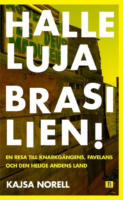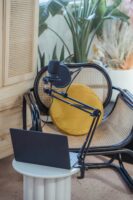Breaking Barriers: Kajsa’s Journey from Sweden to Germany
Media . SocietyI had the opportunity to interview a journalist Kajsa Norell from Sweden. Kajsa has worked in media for many years before moving to Germany. As an international student aspiring to move abroad, I was eager to talk to Kajsa and gain her insights on the subject.
Kajsa’s beginning
Kristýna: My first question is, what initially sparked your interest in pursuing a career in media?
Kajsa: It was really by chance. I was in a phase where I wasn’t really sure what I wanted to do. Journalism studies was one of the most difficult ones to enter and very prestigious. I got a place in that course and I was like, oh, since I got the place, I should try it.
Then it was so clear to me on the first day when I set foot onto the grounds of the journalism department at the University of Stockholm, that this was it. It was so clear to me that this was my calling.

Kristýna: Can you walk us through your journey into media leading up to your current role?
Kajsa: At journalism school, we started a feminist student newspaper. It was a little bit humorous and satirical. Eventually, we decided to do a radio show about this. We pitched the idea to Swedish radio and to our big surprise, they agreed. So, while still at university, we started doing this radio show. Apart from that, it was basically a very classical career path.
I did my internship with the local radio in a smaller town in Sweden, where I really learned the basics. Eventually, I started to work in Stockholm.
I tried out so many different things, so I never had the feeling of being really stuck in one place. However, I worked there for a long time.
Kajsa’s journey in Germany
I also took a leave to write a book. And then once we moved to Germany, it was like, ooh, what do I do now? Also, journalism, especially if you do reporting yourself, is very tied to the language. And especially if you do radio, right? You can immediately hear that, she’s not German.

But since I was in a management position when I left Swedish radio, I was doing curation in the podcasting app, like choosing what podcast to put up front and stuff like that.
Then I saw that this position opened up. And it was like, this is my job but in German.
I asked them like, hey, I would love to apply for this job, but my German is not perfect. Is this a problem for you? And they were like, no, that’s not a problem.
Then to my big surprise, I was offered a job and I started working there.
Kristýna: That’s really inspiring we talked about this with the Erasmus students. Communication is so tied to the language and we don’t stand a chance here. So it’s really great to hear that you did it. What are the key skills or competencies that aspiring communicators should have?
Kajsa: That’s a very good question. I think curiosity is a very important skill to have and a passion for learning.
Because one thing is sure, in our area, nothing stays the same. And if you are trying to protect what you have and keep doing what you’ve always done, then you’re going to be gone. So you need to be open-minded and evolve. Then, of course, you need to be interested in what people do, where and on what platforms they are, and how they talk. So you have to keep learning new stuff and new trends all the time.
Kristýna: That makes sense. So, as you were describing your work at ARD in Germany, how would you describe your responsibilities and your daily tasks?
Kajsa: So, I’m in charge of a team of 12 to 15 people. And I’m in charge of organizing the workflows, leading the meetings, and creating a decent atmosphere for them.
I also do quality checks and development of making sure like, okay, the way we write our headlines. Is this really the best way? Or these pictures, how can we make sure that the pictures are top-notch and really attractive for somebody coming into the app?

Kristýna: Do you think this job helped your German a lot?
Kajsa: Oh, yeah. You know, it’s a huge difference, I would say since I started two years ago. And sometimes I think that this is like a German class. I go to a German class every day.
Kristýna: Wow. This must be hard.
Kajsa: It was super tiring, especially in the beginning. Like at the end of each working day, I was like, let me sleep. Because you have to work so hard, yeah, it’s hard working in another language. It’s double the work. Being a journalist I’m used to language being my best friend. But then all of a sudden, you are really fumbling and struggling to find words.
Kristýna: So what are the habits you had to adapt here?
Kajsa: A lot of patience. I think this is my biggest challenge. Here I need to provide a box of evidence. Work within this box. Everything is set. I think it’s very stereotypical to say that German people like, like the rules. And they don’t step outside of it. But I guess it’s true even in the workforce.
Kristýna: What advice would you offer professionals who find themselves navigating cross-border roles?
Kajsa: Do it. Because you learn so much about yourself. I mean, this is an obvious thing, go digital. Especially if you want to find a job in Germany. If you stay in this digital sphere, you’re going to have an advantage. Then also you have to have a bit of luck, as I did. And I think it’s usually good to have somebody who can recommend you.
Kristýna: I feel especially for women. It’s hard when you want to have a family. And still try to work abroad. What was your experience?
Kajsa: Yeah, for me, it was a bit of a special case. Because my husband first got a job when we moved here. And the first year I was studying German. And trying to get the kids settled in. But then he started working again in Sweden. So it was like lots of going back and forth. When I came here, again, it was easy enough. But I think the labor market here for parents is very tricky.
After I finished my interview with Kajsa, I left with a sense of hope and motivation. I realized that even in media and communication, where everything you do is deeply connected to the culture and language of the country you’re working in, you can still work abroad. Thank you, Kajsa, for shining a light of hope for us and being such an inspiration.